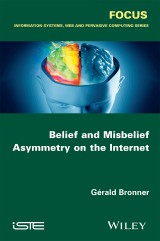Details
Belief and Misbelief Asymmetry on the Internet
1. Aufl.
|
139,99 € |
|
| Verlag: | Wiley |
| Format: | EPUB |
| Veröffentl.: | 15.12.2015 |
| ISBN/EAN: | 9781119261568 |
| Sprache: | englisch |
| Anzahl Seiten: | 300 |
DRM-geschütztes eBook, Sie benötigen z.B. Adobe Digital Editions und eine Adobe ID zum Lesen.
Beschreibungen
<p>This book discusses the media, beliefs, the news, the Internet, etc. but it should not be seen as yet another critique of the media system, exploring with indignant fascination the idea of a machination against truth set up to serve a society of domination. These kinds of theories, whether they pertain to conspiracy theories or, more subtly, to a self-styled "critical" way of thinking, have always seemed to be the expression of a form of intellectual puerility. This is not to say that attempts at manipulating opinions do not occur, or that our world is free from compromised principles, or indeed corruption; far from it, but none of this is the key issue.</p> <p>In fact, reality can somehow be even more unsettling than those myths, however sophisticated they may be, that envisage the media system hand-in-hand with industry, science, and so forth, all in agreement so as to lead the "people" away from the truth. It is more unsettling because the processes described in this book and that allow falsehood and dubiousness to take hold of the public sphere are boosted by the development of IT, the workings of our minds, and the very nature of democracy. And finally, it is more unsettling because we are all responsible for what is going to happen to us.</p>
<p>Preface vii</p> <p>Introduction ix</p> <p><b>Chapter 1. More is Less: Mental Avarice and Mass Information 1</b></p> <p>1.1. The revolution of the cognitive market 1</p> <p>1.2. Amplification of the confirmation bias 6</p> <p>1.3. The Seattle affair 9</p> <p>1.3.1. The Wason experiment 10</p> <p>1.4. The theorem of information credulity 14</p> <p>1.5. Filter bubbles 17</p> <p><b>Chapter 2. Why Does the Internet Side with Dubious Ideas? 19</b></p> <p>2.1. The utopia of the knowledge society and the empire of beliefs 19</p> <p>2.2. The ditherer’s problem 20</p> <p>2.3. Competition between belief and knowledge on the Internet 23</p> <p>2.4. Psychokinesis 27</p> <p>2.5. The Loch Ness Monster 27</p> <p>2.6. Aspartame 28</p> <p>2.7. Crop circles 28</p> <p>2.8. Astrology 29</p> <p>2.9. Overview of resutls 30</p> <p>2.10. How can we explain these results? 30</p> <p>2.11. The Titanic syndrome 31</p> <p>2.12. When Olson’s paradox plays against knowledge 34</p> <p>2.13. Charles Fort, his life, and his works in a few words 36</p> <p>2.14. Fort products: argumentative mille-feuilles 38</p> <p>2.15. The sharing of the arguments of conviction 40</p> <p>2.16. A Fortean product in the making: Michael Jackson’s fake death 42</p> <p>2.17. When Fort reinforces Olson 44</p> <p>2.18. Would you believe it! 46</p> <p>2.19. It is all in the Bible, all of it 49</p> <p>2.20. The transparency paradox 52</p> <p>2.21. A shorter incubation period 56</p> <p><b>Chapter 3. Competition Serves the Truth, Excessive Competition Harms It 61</b></p> <p>3.1. Michael Jackson’s son, abused by Nicolas Sarkozy 61</p> <p>3.2. A “prisoner’s dilemma” kind of situation 63</p> <p>3.3. Presidential unfaithfulness and the burnt Koran 66</p> <p>3.4. The IRC curve (information reliability/competition) 72</p> <p><b>Chapter 4. What Can Be Done? From the Democracy of the Gullible to the Democracy of Enlightenment 77</b></p> <p>4.1. The hope of the astrophysicist 77</p> <p>4.2. The bad education 80</p> <p>4.3. When gullibility looks like intelligence 83</p> <p>4.4. The sum of imperfections 88</p> <p>4.5. Toward cognitive demagogy 93</p> <p>4.6. How to keep the illusion scholar inside us in check 96</p> <p>4.7. Declaration of mental independence 98</p> <p>4.8. The fourth power 102</p> <p>4.9. A new form of scientific communication 104</p> <p>4.10. A new militancy 106</p> <p>Conclusion 109</p> <p>Bibliography 111</p> <p>Index 121</p>
<p><strong>Gérald Bronner</strong> is Professor of Sociology at Paris-Diderot University in France. He is a member of the Academy of Technologies of France and the author of numerous books. He has won several prizes, including the prestigious EUROPEAN AMALFI PRIZE For Sociology and Social Sciences.
Diese Produkte könnten Sie auch interessieren:

From Combinatorics to Philosophy

von: Ernesto Damiani, Ottavio D'Antona, Vincenzo Marra, Fabrizio Palombi

149,79 €
















